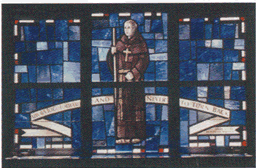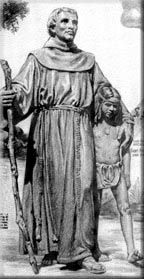Miguel Jose Serra was born in Majorca, Spain. At the young age of 16, he entered into service to God, joining the Order of Saint Francis, and taking the name Junipero—in honor of Saint Juniper, the saintly friar companion of Saint Francis. Ordained at age 24, Junipero studied in Parma, the capital of Majorca, and taught philosophy and theology at the monastery of San Francisco at Lullian University for over a decade. Serra was known as a bright, articulate scholar -- a moving speaker and a clear, precise writer -- but he did not remain long in academic life. In 1749, at the age of 37, Junipero answered the call for missionaries, and left Europe, heading to the New World Western mission territories.
Junipero left Cadiz, Spain and sailed for Vera Cruz, Mexico. During the voyage, he suffered an insect bite which led to significant physical difficulties with his leg-- an ailment which remained for the rest of his life. Upon arrival in the New Work, he traveled by foot (as would become his custom, despite his physical limitations) to Mexico City to dedicate his mission vocation at the shrine of Mexico's Our Lady of Guadalupe. He then received his first assignment—the rugged, mountainous region of Mexico known as Sierra Gorda. Friar Junipero embraced his mission work, learning the language of the native Pame Indians and translating the Catechism for them. He remained at Sierra Gorda for nine years, strengthening and building missions.
Soon, word of Blessed Junipero’s commitment and skill spread, and he was re-assigned. His next mission was to journey from Mexico City into the coastal villages and mining camps. Again, despite his continuously infected and now ulcerated leg, he walked over 6,000 miles over eight years, preaching, converting, baptizing, and establishing missions. Before he was finished, Junipero would establish and oversee construction of 21 missions in California and Mexico. He was appointed Superior of Baja California, and later “padre president” of the region. He linked his 21 missions—each a one-day 30 mile walk from each other—by a dirt road, named “El Camino Real.”
Throughout his mission work, Father Serra sought to protect the native peoples, who were often ill-treated by the Spanish settlers and rulers. He struggled valiantly with military leaders, eventually becoming instrumental in the establishment of the “Regulations”—effectively, the first “bill of rights” for native peoples in the New World. He also spent time with the indigenous of the region, learning their language, teaching European farming techniques, animal husbandry, and arts and crafts. During his homily at Serra’s beatification, Pope John Paul II said: “Relying on the divine power of the message he proclaimed, Father Serra led the native peoples to Christ. He was well aware of their heroic virtues—as exemplified in the life of Blessed Kateri Tekakwitha [July 14]—and he sought to further their authentic human development on the basis of their new-found faith as persons created and redeemed by God. He also had to admonish the powerful, in the spirit of our second reading from James, not to abuse and exploit the poor and the weak.”
Despite constant setbacks, ill health, cold, hunger, and threat of bodily harm from military leaders and native Indians, Blessed Junipero never turned from his mission task. He kept with determination to his watchword, "Always to go forward and never to turn back." He is known for saying: "All my life I have wanted to be a missionary. I have wanted to carry the gospel message to those who have never heard of God and the kingdom he has prepared for them."
Friar Serra was imbued with a penitential spirit and practiced austerity in sleep, eating, and other activities. During his preaching, he would frequently enact harsh bodily penance, for the conversion and inspiration of his listeners. As described by his biographer, Palau, on one occasion:
“Imitating his devout San Francisco Solano, he drew out a chain, and letting his habit fall below his shoulders, after having exhorted his auditory to penance, he began to beat himself so cruelly that all the spectators were moved to tears, and one man rising up from among them, went with all haste to the pulpit and took the chain from the penitent father, came down with it to the platform of the presbiterio, and following the example of the venerable preacher, he bared himself to the waist and began to do public penance, saying with tears and sobs, ‘I am the sinner, ungrateful to God, who ought to do penance for my many sins, and not the father who is a saint.’ So cruel and pitiless were the blows, that, in the sight of all the people, he fell down, they supposing him to be dead. The last unction and sacrament were administered to him there, and soon afterward that he died. We may believe with pious faith, that this soul is enjoying the presence of God.”
Numerous miracles were attributed to the intercession of Friar Serra, recorded by his biographer, Palau:
“When he [Serra] was traveling with a party of missionaries through the province of Huasteca [in Mexico], many of the villagers did not go to hear the word of God at the first village where they stopped; but scarcely had the fathers left the place when it was visited by an epidemic, which carried away sixty villagers, all of whom, as the curate of the place wrote to the reverend father Junípero, were persons who had not gone to hear the missionaries. The rumor of the epidemic having gone abroad, the people in other villages were dissatisfied with their curates for admitting the missionaries; but when they heard that only those died who did not listen to the sermons, they became very punctual, not only the villagers, but the country people dwelling upon ranchos many leagues distant.
Their apostolic labors having been finished, they were upon their way back, and at the end of a few days’ journey, when the sun was about to set, they knew not where to spend the night, and considered it certain that they must sleep upon the plain. They were thinking about this when they saw near the road a house, whither they went and solicited lodging. They found a venerable man, with his wife and child, who received them with much kindness and attention, and gave them supper. In the morning, the Fathers thanked their hosts, and taking leave, pursued their way. After having gone a little distance they met some muleteers, who asked them where they had passed the night. When the place was described, the muleteers declared that there was no such house or ranch near the road, or within many leagues. The missionaries attributed to Divine Providence the favor of that hospitality, and believed without doubt that these hosts were Jesus, Mary, and Joseph, reflecting not only about the order and cleanness of the house (though poor), and the affectionate kindness with which they had been received, but also about the extraordinary internal consolation which their hearts had felt there.”
At the age of 70, and after traveling 24,000 miles, Father Junípero Serra died at Mission San Carlos Borromeo and is buried there under the sanctuary floor. He was beatified by Pope John Paul II on September 25, 1988, and is currently being considered for Canonization. The zeal with which Blessed Junipero lived his life inspires us each to serve the Lord with the entirety of our hearts, souls, and lives. What a difference we might make in the world if we were to embrace our apostolic calling with the same vigor and commitment that Blessed Junipero did!
God most High,
your servant Junipero Serra
brought the gospel of Christ
to the peoples of Mexico and California
and firmly established the Church among them.
By his intercession,
and through the example of his apostolic zeal,
inspire us to be faithful witnesses of Jesus Christ,
who lives and reigns with you and the Holy Spirit,
one God, forever and ever.
Amen.
Inspired by the origins and spiritual history of the Holy Rosary, we continue our meditation on the psalms, one each day, in order, for 150 days.
Today’s Psalm: Psalm 67: Harvest Prayer That All Men May Worship God
1 May God be gracious to us and bless us
and make his face shine upon us,
2 that your ways may be known on earth,
your salvation among all nations.
3 May the peoples praise you, O God;
may all the peoples praise you.
4 May the nations be glad and sing for joy,
for you rule the peoples justly
and guide the nations of the earth.
5 May the peoples praise you, O God;
may all the peoples praise you.
6 Then the land will yield its harvest,
and God, our God, will bless us.
7 God will bless us,
and all the ends of the earth will fear him.
Day 182 of 365
Prayer Intentions: Zeal for the work of God; Safety and success of missionaries.
Requested Intentions: Healing of illness (P); Small business assistance, blessings on jobs, financial aid for college student (M); Financial assistance (F); For a recovery and sanctification (X); For a daughter struggling with disease and illness (T); For all lost children (I); Prosperity, health, healing, and conversion for a family (M); Health and healing of a mother (A); Healing of heart and mind (T); Healing of a new relationship before marriage (K); Healing of a relationship (T); Eternal rest for the dearly departed, end to financial struggles, successful sale of home, ability to travel on pilgrimage (L); For healing of a stomach illness (L); For the repose of the soul of a sister (C); Vocational security for family, Financial security for daughter beginning college (M); Vocational guidance, courage and strength (I); Health for an ailing nephew (A); Those suffering from depression (J); Successful adoption (S); Healing of a father battling cancer (S).
Psalm: Psalm 67: Harvest Prayer That All Men May Worship God












No comments:
Post a Comment
Thanks for leaving a comment. If you wish to submit a prayer request, however, please do so above, using the "Contact" tab.